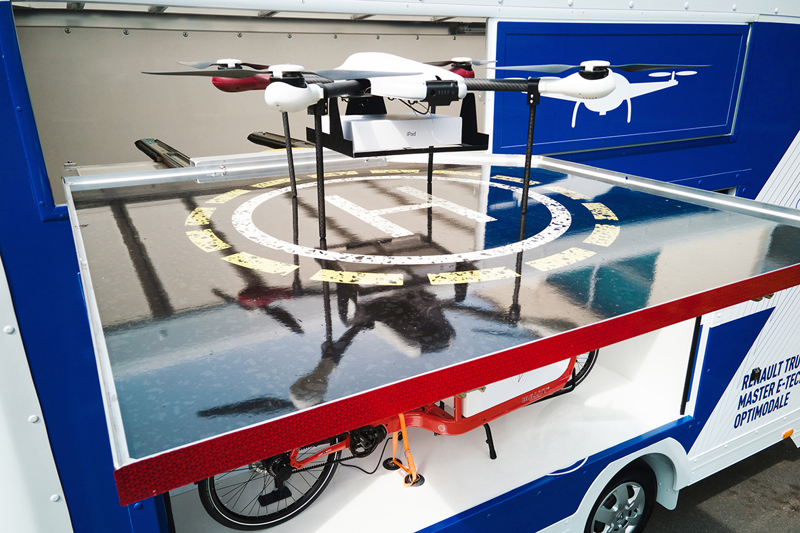Electric is the great leveller.
In the car (Tesla, Polestar, Hyundai) and van (Arrival, Maxus, Tevva) markets, it has resulted in a surge of popularity for new entrants and fleet also-rans that had the foresight to make early investment in electric technology.
Now it’s the turn of trucks.
Progress to date has been laboured, with plenty of column inches about electric trucks, but little evidence of them reaching the market.
One exception is Renault Trucks, which has seized the opportunity in the mid-to-heavy end of the market, and notably in specialised vehicles, to engage with existing and new customers.
“Electric has opened up the market to us; we are talking to so many more customers,” James Charnock (pictured), Renault Trucks UK commercial trucks and services director told Commercial Fleet.
“We’ve put in the investment and customers are responding – we’ve even sold some diesel to new customers as a result of our EV conversations! Electric is levelling the whole market.”
Already offering a range of distribution products from 16-tonne to 26-tonne, Renault is claiming a UK first with an 18-tonne D-Wide electric skip which is entering operation with Recycling Lives.
Meanwhile, an electric tractor unit, promising 300,000km/186,400 miles and sub-one-hour superfast charging, and C range of construction trucks, including tippers and cranes, will be launched next year.
“We are showing what’s possible. Electric can work in so many operations, but companies need to have more stakeholders involved in the decision, such as facilities management,” Charnock says. He adds:
“Companies have to build a plan on how to decarbonise their fleets – we are hearing lots of announcements but without a plan. My team can help them do that.”
Renault Trucks has accumulated a wealth of knowledge about operating electric vehicles since launching its first electric trucks 18 months ago. It has spoken to more than 200 companies, with most considering the lighter distribution trucks as their first steps into decarbonisation.
Warburtons, for example, has found the 4x50kWh batteries on its trucks more than adequate for its daily needs (Renault has since upgraded the pack to 4x66kWh). It has been achieving 197km (122 miles) of range and, while this falls during winter, it is better than expected.
Renault Trucks works with customers to calculate how much power per kWh the vehicle will consume based on type of operation. This enables it to establish the range requirement.
“The battery will degrade over time, but we have a battery promise to guarantee the performance for either 10 years or 300 megawatt hours,” says Charnock.
“We have to ensure that on the last day of the contract deal, that truck will still fulfil the range requirement.”
To put this into context, a skip may do 30,000km (18,640 miles) a year which would require 294 megawatt hours over seven years; consequently, Renault would determine the best deal to be a seven-year contract hire.
The 4x66kWh pack provides 265kWh of power, while the battery management system allows the operator to use up to 80% of the charge. Once the unit has consumed 300kWh, it loses another 20% of use.
“So, we have to ensure that after the 20% loss, the vehicle will still do the job,” Charnock says, although he says Renault is deliberately conservative with its calculations.
Most customers are running back-to-base operations and work within a mileage tolerance.
Adding one electric truck to the fleet is comparatively straightforward; however, Renault is increasingly having conversations with operators that could have 50 or 100 electric trucks within the next three or four years.
That often necessitates discussions with distribution network operators (DNOs) about power supply and capacity, although alternative solutions also exist.
“We can put a container full of old batteries into a yard that can fast charge a truck instead of having to increase the DNO capacity,” Charnock explains.
“There are solutions to most challenges.”
The other hurdle often preventing a business from making the investment is the higher capital cost, which Charnock admits can be “frightening” at first glance. He urges fleets to consider the total cost of ownership (TCO), where greatly reduced maintenance and fuel bills help to offset the price.
The matrix will also be affected by economies of scale; as more electric trucks come to market, so the cost of the batteries will come down.
“We are at the point where TCO versus diesel is a bit more expensive, but there are exceptions,” Charnock says. “For example, you can get cost parity for a bin truck – or better – because it might be run for eight-to-10 years and the diesel efficiency is just 2mpg. You also have to futureproof your company for changes to urban transport rules over that time.”He adds:
“When evaluating TCO, many assume that the diesel will have a value in eight years’ time. But if you can’t take it into the city, then it will be valueless.
"There are unknown legislation issues that could come into play.”
By the end of the year, Charnock expects to have 50 electric trucks on UK roads; Renault currently has 10, some of which are on demo. But the pace of change is accelerating.
“We were initially aiming for 10% of sales to be electric by 2025. Then we thought it would be closer to 25% because of the demand. Now we are considering 50% of the ranges where electric is possible,” Charnock says.
With Renault Trucks registering around 2,200 trucks a year (6% market share), that could equate to up to 1,000-plus electric units.
“Overt the past three-to-six months, there has been a shift in mentality with companies coming to us to ask for our help in decarbonising their fleets,” Charnock says. “They’ve gone from being interested to wanting to make the change.”
Three-in-one solution for last mile distribution
A legacy of its former ownership by Renault cars is holding the rights to sell the Master 3.5-tonne light commercial vehicle, which gave the company the perfect platform to launch a last-mile distribution concept earlier this year.
Master OptiModale combines three types of electric transportation in one vehicle: electric van, electric cargo bike and drone.
The specially-commissioned low loader Luton body holds the parcels and acts as the mothership for the eCargo bike and drone delivery service.
“We took ideas from our customers and brought them to reality,” explains James Charnock.
“It’s a showcase that reveals the art of the possible for inner city distributions and we’ve had a lot of people talk to us about it.”
The E-Tech Master OptiModale is a two-person operation. Larger parcels are delivered by van, while the second team member takes the eBullitt cargo bike for last-mile deliveries where congestion is at its worst. Additionally, the drone provides rapid deployment for urgent situations, such as delivering vital drugs or supplies to challenging or inaccessible locations.
The Renault Trucks E-Tech Master platform cab chassis has a range of around 80 miles, while the eBullitt electric cargo bike can carry up to 100kgs of smaller parcels. The drone, meanwhile, sits on a retractable helipad and can transport high value loads up to 2kgs in weight.





















Login to comment
Comments
No comments have been made yet.